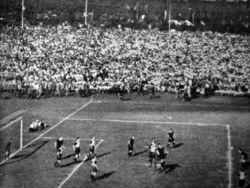- The Institute
- Research
- Dictatorships in the 20th Century
- Democracies and their Historical Self-Perceptions
- Transformations in Most Recent History
- International and Transnational Relations
- Edited Source Collections
- Dissertation Projects
- Completed Projects
- Dokumentation Obersalzberg
- Center for Holocaust Studies
- Berlin Center for Cold War Studies
- Publications
- Vierteljahrshefte
- The Archives
- Library
- Center for Holocaust Studies
- News
- Dates
- Press
- Recent Publications
- News from the Institute
- Topics
- Reordering Yugoslavia, Rethinking Europe
- Munich 1972
- Confronting Decline
- Digital Contemporary History
- Transportation in Germany
- German Federal Chancellery
- Democratic Culture and the Nazi Past
- The History of the Treuhandanstalt
- Foreign Policy Documentation (AAPD)
- Dokumentation Obersalzberg
- Hitler, Mein Kampf. A Critical Edition
- "Man hört, man spricht"
- Dictatorships in the 20th Century
- Democracies and their Historical Self-Perceptions
- Transformations in Most Recent History
- International and Transnational Relations
- Edited Source Collections
- Dissertation Projects
- Completed Projects
- Dokumentation Obersalzberg
- Center for Holocaust Studies
- Berlin Center for Cold War Studies
FC Bayern Munich 1929−1949: The Rise and Decline of a Football Club within the Context of the Development of German Football
Projektinhalt:
The rise of FC Bayern Munich through to its first national championship in 1932 is closely connected with the efforts of its Jewish members. Bayern would nevertheless introduce an “Arian paragraph” to its statutes during the Nazi era and would establish the position of “Dietwart”, whose task it was to ensure that all activities were carried out in line with National Socialist ideas. While recent publications have focused on individual aspects of this process, the club’s relationship with National Socialism remains a subject of controversy.
This study, carried out by Gregor Hofmann under the supervision of Frank Bajohr since March 2018, seeks to present a coherent history of Bayern Munich beyond the team’s sportive achievements. The study begins with a look into the rise of the club in the Weimar Republic, as football matches were turning into mass events and the “ideals” of sport and the relationship between the bodies of individual people and that of the collective ethnic “Volk” became the subject of bitter dispute. The study’s focus lies on the club’s Jewish members, who played such a decisive role in the organization until their exclusion, as well as on other actors who were not subjected to persecution after 1933: officials, athletes, sponsors, and other club members and associates.
Bayern is not to be examined on its own but also in terms of the conditions and leeway granted to sport by the regime, and with the club itself viewed within the context of Munich as the “Capital of the Movement”. Links to other recent research on National Socialism are to be established as well.







